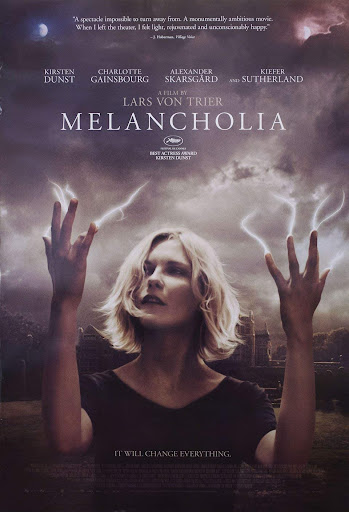Kirsten's got the doomsday blues
Wednesday, April 20, 2022
Part somber meditation on the lingering effects of depression and anxiety, part fear-inducing futuristic tale, Danish director Lars von Trier’s Melancholia boasts a sparkling cast that includes Kirsten Dunst and Charlotte Gainsbourg, memorable performances, and unique visual flourishes that will intrigue your imagination long after the picture ends. We gave this movie the CineVerse treatment last week and came to the following observations and conclusions (to hear a recording of our group chat, click here).
What was it about this movie that you found distinctive, unexpected, interesting, or curious?
- It’s technically a science-fiction film and an apocalyptic story, but it doesn’t abide by the same tropes and conventions of so many other disaster/sci-fi movies. There is no focus on modern technology, the role of the government or the media, or characters outside of this extended family and the wedding guests. The filmmakers refreshingly choose not to lather on showy special effects depicting mass destruction. Likewise, it isn’t scientifically realistic in portraying how a rogue planet would approach Earth or cause destruction.
- However, the threat and situation are real – this is not meant to be some allegorical facsimile. In this narrative, there is a wayward planet genuinely speeding toward Earth that will bring about our destruction.
- The prologue visually depicts the collision of this planet – Melancholia – with Earth; there is no doubt about how this story will end, which makes us focus more on how this doomsday event will affect the main characters.
- Lars von Trier said in an interview: “In a James Bond movie, we expect the hero to survive. It can get exciting nonetheless. And some things may be thrilling precisely because we know what's going to happen, but not how they will happen. In Melancholia, it's interesting to see how the characters we follow react as the planet approaches Earth."
- Because Justine acts so strangely and she and other characters are difficult to like and embrace, it can be challenging for viewers to warm up to this film and tolerate an extended wedding sequence in which awkwardness, uncomfortable situations, and strange behaviors happen.
- However, both Justine and her sister Claire may be unreliable narrators; while we follow their points of view throughout two chapters, consider that what we see could be subjective perceptions that are psychologically skewed and perhaps should not be taken literally.
Major themes
- Depression and anxiety and their effects upon thoughts and actions.
- This movie was inspired by a depressive episode experienced by von Trier. An analyst told him that depressed individuals often respond more calmly under pressure than others, as they anticipate that negative things will likely occur.
- Justine embodies depression. Ponder how debilitated, lethargic, and apathetic she appears during her wedding reception and in the immediate days after, at which time it’s assumed that the approaching Melancholia has not yet been determined to be a lethal threat to our planet. But once it has, Justine acts more normally and complacently, suggesting that she is at peace with Earth’s impending doom.
- Film Quarterly writer Rob White wrote: “I think of Melancholia as an exploration of something I want to call ‘objective depression,’ where the pathology is reflected in the world and the world in the pathology: the depressive’s feeling that nothing matters, that we’re all doomed anyway is turned into brute fact… Justine is able to turn her subjectivity inside out because she can relate far better to a destructive planet than she can her husband or family: Is the “moral” of the film that the female depressive is a menace because she is unmoored and unstable, and resilient to the charms of the male universe? Casting Kirsten Dunst, a kind of cinematic American sweetheart, as the ‘objective depressive,’ is inspired: Dunst’s face, so sweet when she’s being ‘good,’ becomes so savage and so petulant when her mood turns sour.”
- Claire, on the other hand, exemplifies anxiety. Consider how unnerved she becomes in the latter part of the story and how she craves assurance and comfort from her husband.
- Nihilism and the belief that life is ultimately meaningless.
- Justine subscribes to this tenet and demonstrates, in her erratic and unconventional behavior, that trying to live up to others’ expectations and abide by society’s codes, standards, and mores is pointless. Recall how she rejects her sister’s request for a ceremonial farewell on her terrace before Melancholia crashes into Earth and how Justine keeps people waiting during the wedding reception.
- Film Quarterly writer Nina Power wrote: “Justine has two modes of nihilism: aggressive and passive, in that order. The former sees her question the ‘usual’ structures: marriage, work, family responsibility. The latter sees her reconciled (albeit with a snarl) to the imminent destruction of the planet. These nihilisms can be seen as models of knowledge far more apt than the neurotic position held by Claire, or the economic–rational mode represented by John (”you have to trust the scientists”)... Justine is far ‘saner’ than the rest of her family.”
- Family ties and familial dynamics. Justine and Claire seem to be opposite in personality and demeanor. Still, interestingly, Claire arguably becomes the less psychologically grounded of the two by the end of the story, while Justine seems to be calm and centered. Also, contemplate how Justine, Claire, and their mother are susceptible to depression, anxiety, and/or erratic psychological behavior.
Similar works
- Last Year at Marienbad
- Persona
- Another Earth
- Stalker
- The Turin Horse
- Don’t Look Up
- Tree of Life
- When Worlds Collide
- Masterpiece paintings, including Ophelia by Millais
Other films by Lars von Trier
- Breaking the Waves
- Antichrist
- Nymphomaniac
- The House That Jack Built




